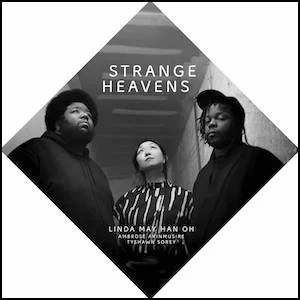Label: Biophilia Records, 2025
Personnel - Ambrose Akinmusire: trumpet; Linda May Han Oh: bass; Tyshawn Sorey: drums.
The power of the jazz trio is strongly felt on Strange Heavens, the new outing from acclaimed bassist and composer Linda May Han Oh. This 12-track recording finds the bassist teaming up with drummer Tyshawn Sorey, her rhythmic partner in the Vijay Iyer Trio, and trumpeter Ambrose Akinmusire, an exceptional narrative builder who also appeared on her debut trio album Entry (2009).
With each track reflecting Oh’s distinct personality, the album opens with “Portal”, inspired by the stress-inducing nature of today’s social media. A driving bass figure sets the journey in motion, soon joined by delicate trumpet lines and crisp drumming, advancing with rhythmic nuance and melodic breath. The melancholic and moody title track, “Strange Heavens”, stands in contrast to “Living Proof”, which—drawn from her mother’s life story—comes with a rougher attitude, blending punk rock pugnacity with the iridescent hues of modern jazz.
Each members plays with overt virtuosity, crafting a flexible framework where dynamic interplay and solo statements are open to exploration. “The Sweetest Water” is one such piece, hitting hard with limpid trumpet melodicism over astute bass work and tireless drum buoyancy. Other examples include “Home” and “Paperbirds”, two of four compositions inspired by Australian author Shaun Tan’s graphic novel The Arrival. The former—infectious, complex, and ever-shifting—ventures into avant-garde and free territory, while the latter sustains a sense of flow and spontaneity regardless of the unusual time signatures.
“Noise Machinery” is a deliciously groovy number infused with funk, rock, and R&B elements, underscoring the trio’s shared wavelength. Their gift for abstraction shines, and the rendition of late pianist Geri Allen’s “Skin” reaches an exceptional polyrhythmic level with thoughtful push-pull undercurrents. In turn, trombonist Melba Liston’s “Just Waiting”, a softly brushed lullaby, closes the album with the soulful elegance of a timeless jazz standard.
By the time the album draws to a close, listeners are caught in an inescapable musical web, drawn by a creative triangulation rooted in raw, honest interplay. This marks a brilliant return for Oh to the trio format.
Favorite Tracks:
01 - Portal ► 03 - Living Proof ► 06 - Noise Machinery ► 11 - Skin






